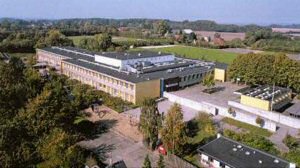Danish participating school and Mathematics topics

SKÅRUP SKOLESkårup Skole is a primary and lower secondary school, comprising forms 0 – 9 (0 is a pre-school year). The pupils are in the age range 6 – 16 years. The school is one of the public 17 schools in the municipality of Svendborg.
| Name of school: |
Skårup Skole |
| Address: |
Østergade 53
DK 5881 Skårup |
| E-mail: |
skaarupskole@svendborg.dk |
| Tel.: |
0045 6223 1136 |
| Fax: |
0045 6223 1156 |
| Web address: |
www.skaarupskole.dk (only in Danish) |
| Head of school: |
Lene Rugaard Jensen |
Number of pupils:
| Number of boys |
Number of girls |
Pupils in all |
| 165 |
173 |
338 |
History and general informationDuring the years 1933-77 Skårup Skole was a state school with the obligation to offer teaching practice to students from Skårup College of Education. There was joint management of the school and the college. In 1977 all state primary and lower secondary schools were taken over by the municipalities and Skårup Skole became one of the many schools that offer teaching practice to students from UCL Lillebælt, Skårup College of Education.
The school is situated in Skårup, a suburb of Svendborg, which was earlier a rural village. However, now most parents are employed in Svendborg. Most of the pupils come from middle class families and live in one-family houses. As in all schools in Denmark, very few pupils have mothers who are housewives. There are very few pupils with ethnic backgrounds.
It is a special challenge for the school that it has to integrate pupils from the neighbouring suburb of Tved when they reach year 7. There have been problems with pupils in years seven and eight because pupils from Tved have found it difficult to become an integrated part of the school. However, the teachers have set up a special programme to integrate these pupils and in August 2007 The Ministry of Education in cooperation with the Union of Teachers appointed Tved Skole “school of the month” because of its success with this programme.
The school finds it very important to have a close contact to the local community.
Teaching aims
- To make sure that the pupils leave the school with the highest possible academic competences
- The interplay between the academic and the practical-aesthetic components is an established part of the teaching
- Teaching is implemented in such a way that the pupils experience joy, challenges and social interplay to the benefit of each individual pupil’s development
- Pupils must experience the necessity of working in a community.
Academic aims
- The pupils achieve basic knowledge of basic concepts in the subjects
- The pupils become able to use this knowledge in a functional way – that is that they are able to solve problems
- This knowledge leads to new cognition which can be used functionally, which means being able to see several aspects of a problem.
Aims for collaboration with the local community
It is the intention that all parts of the local community should know about the possibilities for using the facilities of the school, including:
- Events which cater for the local community
- Facilities that make it possible to have meetings in a relaxed environment
- Local resources and resources at the school should be exploited to the benefit of all parties.
Aims for cooperation with parents
- that the development of all work and culture at the school takes place in a close and mutually binding cooperation with pupils and parents. Contacts are made directly or through pupils’ councils, form councils and the school board.
- that information to parents and pupils is given through newsletters from the management and from form
- that parents get a thorough knowledge of their children’s academic and social development.
Teams
The teachers work in teams comprising year 0 – 3, 4 – 6 and 7 – 9. It is the aim that each team should consist of a small number of teachers thus making it possible that all adults and children know each other. Each team appoints a coordinator who is responsible for the relations to the other teams and to the management of the school. There are 5 team-weeks throughout the year. In all subjects pupils work in such a way that they experience both the relationship between individual subjects and get the possibility of working in depth with broad themes.
Environment
- It is the aim that the school at all times has the best possible physical environment – both for teaching and for activities in the pupils’ spare time.
- The school should have healthy and modern buildings with surrounding areas according to school laws and intentions
- Cleaning should be of a high quality thus providing a healthy environment for all users.
Mathematical topics
in the period November 2008
Applied mathematics and statistics
- Working with statistical descriptions of collected data with focus on method and interpretation.
- Carrying out simulations – among others with computers.
- The concept of statistical probability.
Textbooks
 Click here to see the Danish textbook excerpts on Fractions. Click here to see the Danish textbook excerpts on Fractions.
 Click here to see the Danish textbook excerpts on Pythagora's Theorem. Click here to see the Danish textbook excerpts on Pythagora's Theorem.
|











